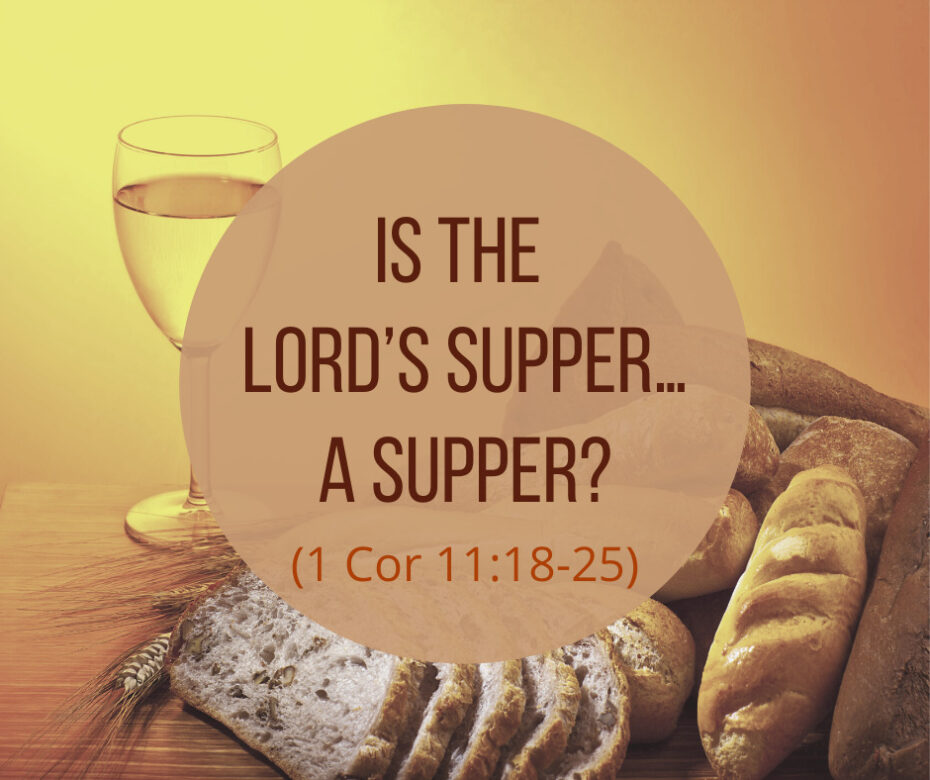Despite COVID and nasty weather, our 2020 National Conference was a success. There were many excellent messages given, which you can watch at our YouTube channel here. But the most important message for me was given by Bob Bryant on The Doctrine of the Church (see here). Here’s why it was important.
Don’t you get the sense that something is off with church?
Maybe you’re bothered by the authoritarianism, or the scandals, or the sense that worship has become worshiptainment, or the lack of accountability, or the difficulty of making personal connections. Whatever the reason, maybe you get the sense that something is not quite right with the way we worship, and you’re looking for something more Biblical. But what?
I am very concerned with worshipping how the NT prescribes. It’s Jesus’ church, so how does He want us to worship? If I’m doing something wrong, I want to know about it, and I want to correct it. To that end, in his talk, Bryant pointed something out about the Lord’s Supper that I had not seen before. I recommend you listen to the message for the full argument. But for now, here is my summary of some key points.
In 1 Corinthians 11, Paul addresses the issue of the Lord’s Supper. If you turn to 1 Cor 11:18 you’ll read:
For first of all, when you come together as a church [en ekklēsia], I hear that there are divisions among you, and in part I believe it (1 Cor 11:18).
Christians can meet together for many different reasons (e.g., to have a BBQ, to see a play, or just to hang out). However, there is a specific en ekklēsia meeting of believers (the phrase occurs in 1 Cor 14:19, 28, 35) that involves celebrating the Lord’s Supper.
What Paul writes next is very important. As you read the next passage, ask yourself two questions. First, how many elements are part of the supper? And second, what order do they occur in?
Here is what he wrote:
For I received from the Lord that which I also delivered to you: that the Lord Jesus on the same night in which He was betrayed took bread; and when He had given thanks, He broke it and said, “Take, eat; this is My body which is broken for you; do this in remembrance of Me.” In the same manner He also took the cup after supper, saying, “This cup is the new covenant in My blood. This do, as often as you drink it, in remembrance of Me.” (1 Cor 11:23-25).
Please note these are the Lord’s instructions. That tells me that I should pay close attention and so should you. So for the first question: how many elements are there?
Of course, the traditional answer is two. You have the bread and the cup (i.e., wine). But how many elements does Paul mention? Isn’t it three? You have the cup, the bread, and a supper. Bryant points out this is a deipnon. This is the ordinary word for “supper, especially a formal meal usually held at evening.” The deipnon is not the same as the bread or the cup. It’s a full meal that you eat with other believers. Did you know that when early believers met together, they would eat a meal? As Acts records:
So continuing daily with one accord in the temple, and breaking bread from house to house, they ate their food with gladness and simplicity of heart (Acts 2:46).
That’s what the Corinthians did, too. The Lord’s Supper is a…supper! It was not a cracker and a gulp of grape juice, but food that people shared together.
Second question: what is the order in taking the elements? I had never noticed this before Bryant pointed it out. Read vv 23-25 again. Notice, first the Lord “took bread.” That’s clear enough. But then what happened? Paul says the Lord “took the cup after supper.” If the cup comes after supper, what is the order?
Bread > supper > cup.
The Lord’s Supper begins with the breaking of the bread which starts the meal, then continues with the eating of the supper, and after that comes the cup. I never noticed that before.
Very few churches celebrate the Supper as the Lord delivered to Paul.
In my excitement, I shared this with some Plymouth Brethren folk (who tend to take the Lord’s Supper very seriously). Here were their reactions: “Oh, come on.” “Majoring on the minors.” “So tired of this kind of teaching.” “The point isn’t the supper. The point is remembering Christ in His death until He comes again.” “I highly doubt it really matters.”
Well!
Are those critics right? Does it not really matter whether we celebrate the Lord’s Supper as Paul said he received it from the Lord?
I’ll let Paul answer:
“Imitate me, just as I also imitate Christ. Now I praise you, brethren, that you remember me in all things and keep the traditions just as I delivered them to you…” (1 Cor 11:2, emphasis added).
If you want to be praised, what does Paul say you should do? Keep the traditions just as he delivered them. And that includes the order of bread > supper > cup.


